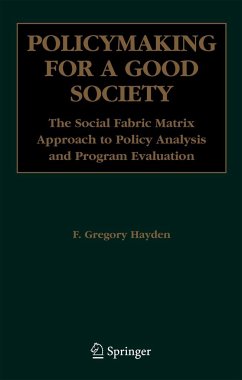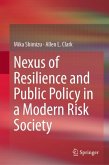This book was written for students of policy science and analysts with policymaking responsibilities who want to understand how to solve social and ecological problems with an integrated systems approach. It describes a method that gives analysts the ability to combine knowledge of social, technological, and ecological systems in order to model real-world complexities that will lead to desirable outcomes.
The author has designed a unique methodology - the social fabric matrix (SFM) - that encourages relevant questions; defines and models a whole that transcends system components and describes their relationships; includes cultural values, social beliefs, and institutional rules; identifies system feedback loops; guides the development of social indicators and builds a database for statistical analysis; coordinates temporal sequences; compares the consequences of alternative policies; and includes the ability to relate research to the broader reality of political action such as lobbying, budgetary processes, and administrative implementation.
F. Gregory Hayden teaches economics at the University of Nebraska.
Society, ecological systems, and technological combinations are sets of ongoing processes that are organized as integrated systems and networks. Consequently, real-world problems-whether labeled social, economic, environmental, or technical-are a result of the ongoing processes that organize and coordinate integrated parts to make undesirable deliveries to each other. Furthermore, the processes are guided by numerous policies and concomitant rules, regulations, requirements, and enforced behavioral patterns. Therefore, there is no reason to expect processes to change or problems to be solved without policy changes. The processes are ongoing, so changes in undesirable deliveries are dependent on changes in policies. One premise of this book is that too often policy analysis is conducted with knowledge bases and tools that are not appropriate for the task of analyzing and understanding complex socioecological and sociotechnical systems leading to wasted resources, policy failure, and frustration. The conjunction of the complexity of problem contexts and inappropriate policymaking that follows from insufficient analysis has left citizens frustrated and bewildered. Citizens want problems solved, yet they have lost faith in the ability of policymakers to implement solutions necessary to achieve a good society. Another premise is that it is not necessary to continue down that destructive path. In response, the purpose of this book, briefly stated, is to explain how to model, analyze, and make policy for the social fabric in which society's problems are enmeshed.
Hinweis: Dieser Artikel kann nur an eine deutsche Lieferadresse ausgeliefert werden.
The author has designed a unique methodology - the social fabric matrix (SFM) - that encourages relevant questions; defines and models a whole that transcends system components and describes their relationships; includes cultural values, social beliefs, and institutional rules; identifies system feedback loops; guides the development of social indicators and builds a database for statistical analysis; coordinates temporal sequences; compares the consequences of alternative policies; and includes the ability to relate research to the broader reality of political action such as lobbying, budgetary processes, and administrative implementation.
F. Gregory Hayden teaches economics at the University of Nebraska.
Society, ecological systems, and technological combinations are sets of ongoing processes that are organized as integrated systems and networks. Consequently, real-world problems-whether labeled social, economic, environmental, or technical-are a result of the ongoing processes that organize and coordinate integrated parts to make undesirable deliveries to each other. Furthermore, the processes are guided by numerous policies and concomitant rules, regulations, requirements, and enforced behavioral patterns. Therefore, there is no reason to expect processes to change or problems to be solved without policy changes. The processes are ongoing, so changes in undesirable deliveries are dependent on changes in policies. One premise of this book is that too often policy analysis is conducted with knowledge bases and tools that are not appropriate for the task of analyzing and understanding complex socioecological and sociotechnical systems leading to wasted resources, policy failure, and frustration. The conjunction of the complexity of problem contexts and inappropriate policymaking that follows from insufficient analysis has left citizens frustrated and bewildered. Citizens want problems solved, yet they have lost faith in the ability of policymakers to implement solutions necessary to achieve a good society. Another premise is that it is not necessary to continue down that destructive path. In response, the purpose of this book, briefly stated, is to explain how to model, analyze, and make policy for the social fabric in which society's problems are enmeshed.
Hinweis: Dieser Artikel kann nur an eine deutsche Lieferadresse ausgeliefert werden.








